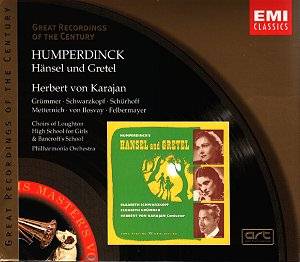
Hansel
Gretel
Witch
Mother
Father
Sandman/Dew Fairy |
Elisabeth Grümmer
Elisabeth Schwarzkopf
Else Schürhoff
Maria von Ilosvay
Josef Metternich
Anny Felbermayer |
| Choirs of Loughton School for Girls and Bancroft's School
Philharmonia Orchestra conducted by Herbert von Karajan |
....The children had to feed themselves
And gain what nourishment they could
By picking berries in the wood.
Subsist on berries! Please don't try it!
They hardly form a balanced diet
And no one's adequately fed
Who merely nibbles Gingerbread .......
MORAL
To save your children from such sins
Just feed them Multivitamins
Keith Norman
from How to be tremendously tuned in to Opera ed E.O.Parrott
This is the pre-eminent Christmas opera (although actually set in the Spring).
Bacharach referred to it as 'Wagner for the Nursery' because Humperdinck
had been closely involved in assisting Wagner in the preparation of Parsifal
from 1880-1881. It is a century since this opera was written and half a century
since this première recording of a complete performance. What can
I add to the acres of print that has been used to extol this recording? It
has been supreme in the catalogue and even now is still a serious consideration
notwithstanding the mono sound. What is so remarkable (if you will allow
me to mix metaphors) is that instead of listening with a wry smile of concession
to 'mono' one is rarely aware of it and even then it is to express amazement
at how good it really is. I was at a friend's house last night trying out
the latest Chandos issues on high-end equipment and making a comparison between
the re-mastered Rachmaninov Second symphony/Previn with the original release
(see review). We then played this recording
and were astounded at the depth and even apparent width of the sound stage,
due entirely to the careful balancing. This is not a fake stereo record,
it is true mono but it sounds uncanny. No wonder many gramophone flat-earthers
used to insist that mono sound was better than the new-fangled stereo gimmick.
This, of course, is down to the skills of producer Walter Legge and the balance
engineer Douglas Larter. The voices are totally unaffected by the age of
the recording and only very rarely does the orchestra sound a little backward
and the strings undernourished and constricted compared to a modern recording.
I do not have earlier CD transfers for comparison but the Penguin Guide noted
a 'curious orchestral bass emphasis' in the original transfer but there is
no trace of that on the re-mastered version. Tape hiss is evident, at about
the same level as a good Dolby B cassette recording, which means that, due
to its consistency, the brain soon filters it out and it does not present
a problem. I can think of a number of stereo transfers to CD that sound worse!
This performance is so vital and spontaneous and yet delicate and affecting
that it has never really been surpassed. Indeed it might be said that it
had actually suppressed the desire of other companies to record this work
at all and I can only number a handful of other recordings (with Pritchard
and Davis as serious contenders).
Richard Osborne has written a new introduction for this re-release which
is both knowledgeable and amusing. I cannot resist quoting that Humperdinck
took a lofty view of composing so had to be persuaded to write a children's
opera 'at a time when upstart Italians were persuading musical Europe that
opera's future lay in sex and violence masquerading as social realism'. We
also learn that part of the success of this recording was that the work was
new to Karajan and yet he did not rehearse over-much, so that Schwarzkopf
remembers it as being a semi-improvised affair with Karajan seemingly 'endlessly
surprised and delighted by the details of the score as they cropped up in
performance'. That must be what gives this remarkable performance its freshness
but equally might account for the rather slow Witch's ride which can be more
exciting. Elisabeth Schwarzkopf sings Gretel and Elisabeth Grümmer is
Hansel, both immaculate in these roles of childhood innocence magically realised
with subtlety of expression and interaction. The overture used on the recording
was an original test recording that was considered to be so good that a further
take was not necessary.
If you have never heard this work I envy you and would point you to the following
highlights: 1) The overture which contains all the big tunes from the opera
and is often broadcast in its own right [1] 2) The Act 1 duet between Hansel
and Gretel [3], 3) Act 2: the Witches Ride [12] 4) The Sandman and Evening
prayer [16 -17] 5) Disc 2 Act 3: Dew Fairy [2] 6) The Witch [8] 7) the Grand
Waltz [13]
Nothing has been spared in the presentation which has the feel of a full-price
offering complete with a full sized, well-illustrated booklet/libretto of
over 150 pages. This does not fit inside the plastic CD case but rests separately
in the slipcase. The two CDs are housed in the traditional bulky double-case
format capable of holding up to four CDs. This is surely more costly to produce
and uses up shelf-space. Considering how many 2for1 CDs are presented
in slim-line packaging I cannot see the point. And that is my only
reservation about this glorious offering!
Highly recommended
Reviewer
Len Mullenger

